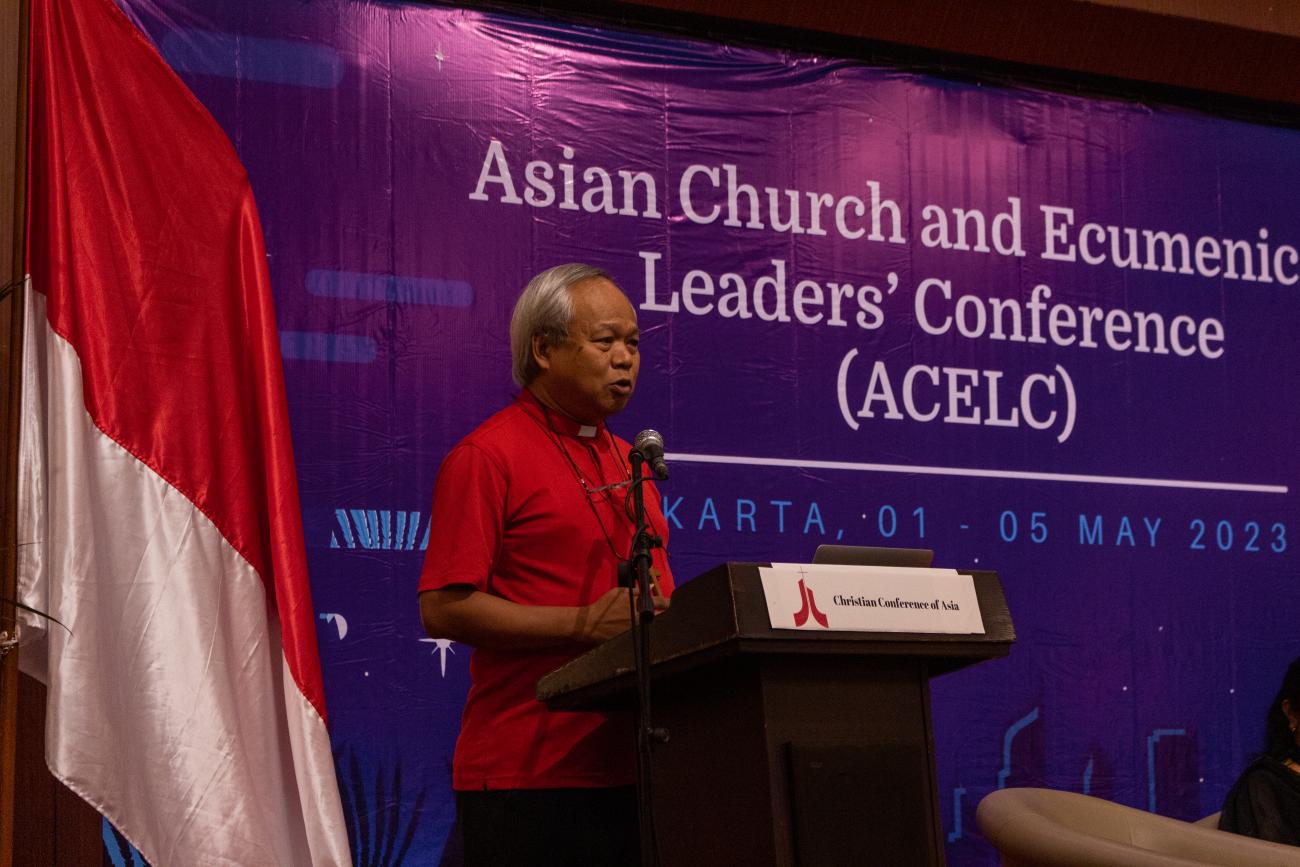Prophetic witness challenges churches to be heralds of God, agents of justice, and advocates of transformation suggests Filipino theologian Bishop Marigza

Bishop Reuel Norman Marigza from the United Church of Christ in the Philippines (UCCP), and the CCA Acting Vice Moderator, speaks on 'Ecumenical Diakonia: Prophetic Witness and Participation in the Struggle for Peace with Justice' on the fourth day of the ACELC
Jakarta, Indonesia: At the Asian Church and Ecumenical Leaders’ Conference (ACELC), Bishop Reuel Norman Marigza from the United Church of Christ in the Philippines (UCCP), who is also the Acting Vice-Moderator of the Christian Conference of Asia (CCA), said that through prophetic witness the Church is challenged to be ambassadors for Christ and heralds of God, agents of justice, and advocates of a new reality so that transformation and reconciliation could be experienced by all people.
Delivering a sobering message and a call to action in the session entitled ‘Ecumenical Diakonia: Prophetic Witness and Participation in the Struggle for Peace with Justice’ on the fourth day of the ACELC, Bishop Marigza said, “The biblical concept of shalom is more than peace…it is wholeness, well-being, growth, harmony, security, and equality—not just the absence of violence and war. No justice, no peace! Know justice, know peace!” He also outlined the struggles or complexities involved in being prophets or human rights defenders in the Filipino context.
The prominent ecumenical leader further said that as ambassadors of Christ, the Church is meant to speak on God’s behalf and proclaim God’s message, a message of reconciliation; as agents of justice, we are called to stand up and speak out against anomalies of exploitation and inequality; and as advocates of a new reality, where people commit themselves to be changemakers.
“In a world under the reign of greed, we must proclaim the reign of God. In a world where injustice prevails, we must proclaim justice and the righteousness of God. We need to see and proclaim an alternative reality to that of the reign of greed and injustice, we need to prophesy what is right. We must not just speak pleasant words, we must not declare illusions—for the faith we profess demands such; the God, the Lord of hosts, whom we serve, requires us to do so,” emphasised Bishop Marigza.
Bishop Marigza also put forth an acrostic ‘PROPHETS’: where ‘P’ was no palliative solutions, ‘R’ was for righteousness and justice, ‘O’ was for overhauling the system, ‘P’ was for pastoral care, ‘H’ was for holding on to the will of God, ‘E’ for exposing the wrongs and evils of our times, ‘T’ for truth-telling, and ‘S’ for sacrifice and self-emptying.
Answering a question from the audience “Where are our prophets today?” Bishop Marigza declared, “Many prophets of their times were reluctant or not eager to do that task…Moses had many excuses, Jeremiah said he was too young. While we may be hesitant to engage in prophetic witness today, we must show serious prophetic discernment and a profound response. The ecumenical movement was most dynamic when we were doing works of advocacy and prophetic witness; we must not lose sight of our history and scriptural roots as the revitalised ecumenical movement today.”
Rev. Romella Robinson, from the Presbyterian Church of Pakistan, moderated the session on the fourth day of the ACELC, which was attended by over 100 Asian church and ecumenical leaders.








